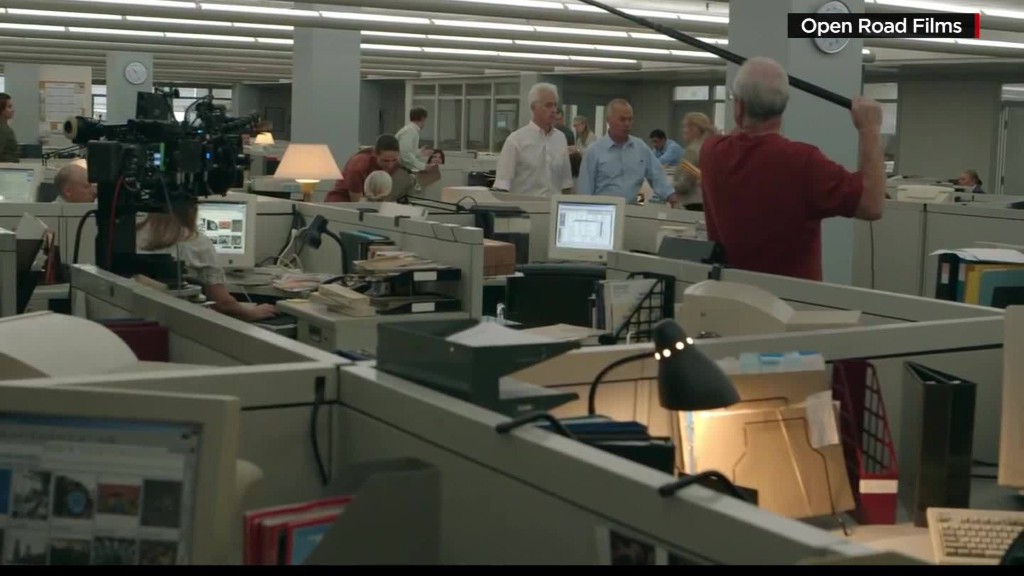
Boston Globe reporter Sacha Pfeiffer called it "the sweetest possible victory."
Sunday night's presentation of the Best Picture Oscar to "Spotlight" was the culmination of a months-long awards season that had Hollywood elites buzzing about old-school, shoe-leather newspaper journalism.
The coveted award was "a celebration of journalism, a reminder of the importance of investigative reporting, and powerful validation for all clergy sex abuse survivors," Pfeiffer said via text message from an after-party in West Hollywood.
Pfeiffer is played by Rachel McAdams in the movie, which recounts the Boston Globe's groundbreaking 2001-2002 investigation into sexual abuse by Catholic Church priests.
As the producers of "Spotlight" accepted the Oscar, many journalists cheered at home and in their own newsrooms, claiming it as a rare bit of good news for an industry that has been gutted by layoffs.
It is the first movie about journalism to win the Best Picture prize since 1947 when "Gentleman's Agreement" won.
Related: 'Spotlight' wins Best Picture
A.O. Scott, chief film critic of The New York Times, was one of the many twitterers who urged viewers to subscribe to "your local newspaper" in a tribute of sorts to "Spotlight."
It is probably unrealistic to expect a sizable uptick in subscriptions or other business side benefits. Time will tell whether the movie energizes the industry in other ways — for instance by encouraging more college students to pursue journalism degrees.
The Globe, at least, is likely to see an uptick in applications for its Spotlight investigative journalism fellowship.
"For those of us who still work at the Globe, this film is a big shot in the arm," Walter "Robby" Robinson, the Spotlight team leader played by Michael Keaton in the movie, said the day before the Oscars ceremony.
Related: read our Q&A's with the six reporters
Afterward, Robinson said he was "gobsmacked" by the win because "the Academy honored good journalism, when what we do seems to have only detractors."
The voters were also honoring expert moviemaking. "Spotlight" won the very first prize of the night, for best original screenplay, a prize accepted by director Tom McCarthy and co-writer Josh Singer.
But then "Spotlight" won nothing for three hours. The movie was passed over in four other categories, which made its supporters nervous. "The Revenant" was believed to be the favorite for Best Picture.
Pfeiffer, Robinson and the other four reporters featured in "Spotlight" were all sitting with spouses inside the Dolby Theatre. Pfeiffer said the single best moment was "the shock of realizing that importance ('Spotlight') had trumped impressiveness ('Revenant') in the best picture category."
"We jumped out of our seats in the upper reaches of the Dolby Theater and whooped with joy," said Ben Bradlee, Jr., who is played in John Slattery in the movie.
One of the Globe reporters, Mike Rezendes, was sitting closer to the stage because he was part of an on-air stunt: host Chris Rock pointed out some of the real people like Rezendes who had inspired moviemakers.
Rezendes came up on stage as the producers and cast members accepted the Best Picture award. He posed for pictures with his actor doppelgänger Mark Ruffalo right afterward.
Ruffalo, McAdams, Keaton and the other actors in the ensemble laid on the theater floor for a group shot.
Then it was time to hit the parties. Reporter Matt Carroll posted a picture of Robinson and a "new friend," the Oscar statue.
He also snapped a photo of Wolfgang Puck's famed 24-karat-gold chocolate Oscars at the Governors Ball party.
The crew traveled next to a "Spotlight" party thrown by Open Road Films, the distributor, at the Palihouse hotel, and then some stayed up for the swanky Vanity Fair after-party at the Annenberg Theatre.
Pfeiffer didn't get back to her hotel until 3:30 a.m. local time.
"What a joyous night," she said. "Now going to bed!"
On Monday the reporters will be heading back to their day jobs and the actors will be thinking about their next jobs.
"Many people in Hollywood have told us that after the Oscars are over, everyone moves on quickly," Pfeiffer said before the big show.
But some of the journalists will continue to speak at public screenings of the movie, particularly in university settings.
For all of the Hollywood glamor, the movie's lasting impact is as much about the issue of clergy abuse as about investigative journalism.
Marty Baron, who oversaw the investigation as the top editor of the Globe, and is now the executive editor of The Washington Post, said the movie has spurred some abuse survivors to speak out for the first time.
While the movie is about the past, a reporting project nearly 15 years ago, "it is not 'past.' Abuse survivors are still living with this," he said.
He recalled a recent screening at his alma mater, Lehigh University, where he estimated 1,000 people were in attendance.
"During the Q&A session, one of the first people to stand up was an 82-year-old man who said he had twice tried to go to the movie, at a local theater, but he had turned around in the parking lot each time," Baron said.
"The reason was that he himself had been abused as a child by a priest at age 12. He had been living with this his entire life. He had never been able to completely shake it. He had never spoken about it -- in fact he had never spoken about it with his late wife -- and he was talking about it now for the first time. His family was there. Then he paused, and he said, 'I just want to say one thing: Thank you.'"
Read more from Baron and the other journalists featured in "Spotlight" here...


